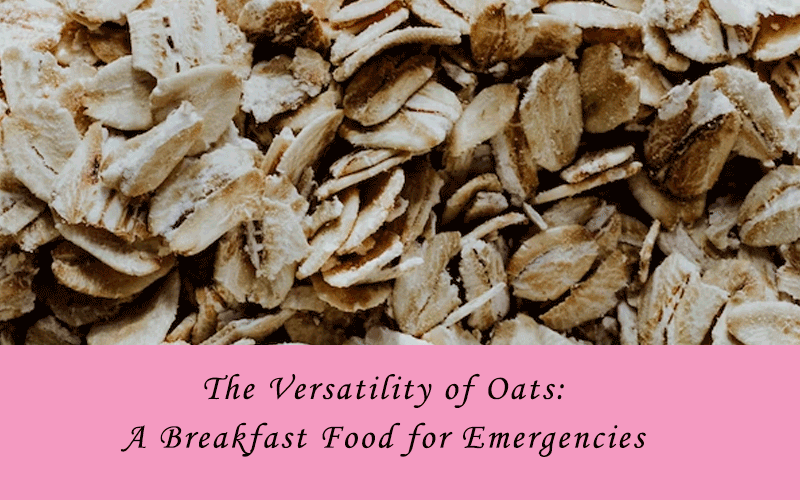The Versatility of Oats: A Breakfast Food for Emergencies
When it comes to emergency and long-term food storage, it’s crucial to select items that not only serve their purpose during crises but also have everyday appeal. In this article, we’ll explore the potential of oats as a reliable breakfast food for emergency situations. By investing in oats, you can ensure both emergency preparedness and regular consumption. Remember the golden rule of “buy what you eat and eat what you store” to avoid wastage. Let’s dive into the details!
1. Oats: A Shelf-Stable Breakfast Option
- Understanding shelf life: While food packages often indicate conservative expiration dates, many items can remain usable beyond that timeframe. Dry foods, in particular, have an extended shelf life. When it comes to breakfast foods for emergency storage, oats come to the forefront due to their impressive longevity.
- Types of oats: Oats come in various forms, each offering unique qualities and cooking times.
- Whole grain oats (groats): The least commonly used option, comprising the entire oat kernel.
- Steel-cut oats: Minimally processed, with a nutty flavor and a creamy, slightly chewy texture. They require 20-30 minutes to cook.
- Old-fashioned rolled oats: Popular and easily recognizable, these oats are flattened between steel rollers after steaming. They cook in just 5-10 minutes, offering a creamy and soft texture.
- Instant oats: Pre-cooked and chopped smaller, these oats have a shorter cooking time of 1-3 minutes. They provide a creamy consistency, though they may be slightly mushy.
2. Shelf Life Considerations
- Longevity of oats: Whole grain oat groats, when stored in optimal conditions such as oxygen-free containers like #10 cans or sealed Mylar bags with oxygen absorbers, can maintain their quality for an impressive 10-30 years. However, due to their limited popularity as a standalone food choice, they require additional processing for optimal edibility.
- Rolled oats for emergency storage: Old-fashioned rolled oats are an excellent choice for long-term breakfast food storage. Properly stored in vacuum-sealed or airtight containers, they can last 10+ years (1-2 years in store packaging). While some argue that steel-cut oats may store better due to minimal processing, the lengthy cooking time makes rolled oats a more practical option.
3. Optimal Choices for Emergency Breakfast Storage
- Rolled oats for the long term: Consider investing in pre-packaged rolled oats specifically designed for long-term storage. Augason Farms offers a 10-pound bucket ideal for emergency preparedness using the 5-gallon bucket method.
- Instant oatmeal for short-term convenience: Instant oatmeal packets serve as a quick and easy solution for addressing immediate breakfast needs during emergencies. Although they are more processed and have a shorter shelf life (1-2 years in regular packaging), regular consumption prevents spoilage.
- Keep track of expiration dates: Flavored or cream-variety instant oatmeal may have varying shelf life expectancies, potentially as short as six months. Ensure you are aware of the “best purchased by” dates to maintain freshness and quality.
- Balancing regular use and emergency supply: If you have children at home, instant oatmeal packets can be a hit due to their added sugar content. Keep a stock of these delicious options for emergency situations, but remember to rotate and replace them to maintain a well-stocked inventory.
By choosing oats as a breakfast food for emergency storage, you ensure a versatile and long-lasting option that can be enjoyed both during crises and in everyday life. Rolled oats are a reliable choice for long-term storage, while instant oatmeal packets







